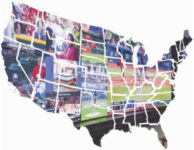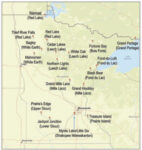
History as a Guide?
By Michael J. Anderson
On January 20, 2017, President Donald J. Trump was sworn in as the 45th president of the United States.
American Indians and Alaska Natives have traditionally voted Democratic in presidential elections, with some exceptions in Alaska, Arizona, Utah, Oklahoma and a handful of other states. Post-election maps typically show pockets of blue (Democrat) in red (Republican) states where Indian reservation residents reside.
It is with this history that Native Americans, along with most of the country, were shocked and surprised that Mr. Trump had won the election. Along with this shock was a genuine fear for many of what a President Trump might mean for Indian Country with respect to sovereignty, the federal budget, the trust responsibility and, of course, for the continued success of the modern buffalo—Indian gaming. This article highlights both the potential opportunities and pitfalls a Trump administration will present for Indian Country.
Reading the tea leaves with respect to Indian gaming policy has always been a challenge with a new president, and current Indian Country leaders have experienced many transitions from the presidential administration of one party to another. President Bill Clinton had virtually no experience with Indian gaming before taking office, yet his administration and policies supported almost $10 billion in Indian gaming revenue growth during the 1990s.
While some tribal leaders were apprehensive of President George W. Bush and his professed support for states’ 10th Amendment rights, his administration continued to accept land in trust for Indian gaming projects and approved dozens of tribal-state compacts. President Barack Obama also was virtually a blank slate with respect to Indian gaming, yet his administration would prove to be one of, if not the most steadfast supporter of Indian gaming projects and compacts in history.
One difference between President Trump and his immediate predecessors is that he was never an elected official, which in most cases might provide some information on Indian gaming policy. Oddly enough, however, Trump’s private-sector experience in the casino industry has provided him with more background on the Indian gaming industry than all of the prior presidents combined. In particular, however, one congressional hearing in 1993 has painted a long-lasting negative impression of Trump that has been difficult for him to overcome.
In 1993, the House Natural Resources Committee chaired by Democratic Chairman George Miller held a hearing on the regulation of Indian gaming, which then was at an early stage. Trump was an invited witness, and provided his perspective as the owner of the Taj Mahal in Atlantic City, New Jersey. He alleged the prospect of organized crime activities in Indian gaming and challenged the authenticity of the Mashantucket Pequot Tribe in Connecticut.
Trump made a number of unsubstantiated and offensive statements in the hearing, including a now-legendary comment that some of the tribal members in Connecticut did not “look” like Indians to him. The Criminal Division of the Department of Justice testified at the same hearing and debunked Trump’s allegations that there was an organized crime presence in Indian gaming.
The introduction of Donald Trump’s negative views to tribal leaders and the National Indian Gaming Association was compounded a year later. In 1994, he testified before an Indiana state legislative committee and opposed an Indian tribe’s potential entry into the South Bend gaming market in Indiana.
If those two activities were Trump’s only experience with Indian tribes, there would be very strong reasons for concern even today. However, as the Indian gaming market grew and alliances were formed with Las Vegas entities and Indian tribes, Trump followed his contemporaries and began to partner directly with Indian tribal governments.
For example, Trump’s organization partnered in the early 2000s with the Twenty-Nine Palms Band in Southern California, and entered into a management agreement with the band. The relationship ultimately was terminated by the band, and while not totally amicable, it did not result in litigation. His corporation also entered into an affiliation with the unrecognized Paucatuck Eastern Pequots in Connecticut and funded their federal recognition efforts. Trump later sued the tribe in 2003 when the Paucatucks unified with the Eastern Pequots and terminated their agreement with Trump. Also in the early 2000s, Trump apparently worked behind the scenes in an attempt to block the St. Regis Mohawk’s efforts to establish a casino in the Catskills, New York.
The most positive statement of Trump’s views on Indian gaming came in a 2000 letter from Trump to the Cowlitz tribe in Washington state. In his letter to Cowlitz Chairman John Barnett, Trump expressed his support for tribal sovereignty and tribal gaming so long as it was properly regulated. He also sought to explain away in part his earlier testimony before the House Resources Committee. Ultimately, the Cowlitz tribe did not enter into an agreement with the Trump organization.
Based on this history, no discernible philosophy on Indian gaming emerges from the past interactions between Indian tribes and Trump. Most of the potential partnerships and lawsuits appear to be driven strictly by business reasons. Even so, it may be of some comfort to supporters of Indian gaming that Trump has had direct dealings with Indian tribal government officials and has even partnered with tribes. This history seems to eliminate the prospect that Trump would harbor any objections to Indian gaming based on moral grounds or that tribes are somehow infiltrated by organized crime or compromised by lack of regulation.
With respect to land-in-trust acquisition for Indian casinos, it is also difficult to see where President Trump and his administration stand. Trump has expressed a strong desire for economic development in rural areas, which could favor tribal acquisitions, especially for energy projects. By contrast, his strong support for states’ 10th Amendment rights could favor a potential veto power over acquisitions that do not have the support of local communities and state governments.
The major official in charge of land acquisitions at the federal level under the Indian Reorganization Act is the secretary of the interior. President Trump has nominated Montana Congressman Ryan Zinke for secretary, and he is expected to be confirmed. Zinke had a number of Montana tribes support his nomination. At his confirmation, he expressed strong support for tribal sovereignty and self-determination. Routine land acquisitions will therefore likely continue, although the more controversial “two-part” off-reservation acquisitions probably reached their high-water mark with the Obama administration.
Like a trained poker player who can read “tells” at the gaming table, observers of Indian Country will soon have some “tells” based on how the Trump administration responds to some late-inning decisions of the Obama administration. In particular, Acting Assistant Secretary Larry Roberts made a number of end-of-administration decisions, some of which are just surfacing in the press.
For example, the Interior Department approved a two-part application for the Shawnee Tribe of Oklahoma for 107 acres that is ready to be submitted to the Oklahoma governor. Since this decision is not terribly controversial, the Trump administration may allow it to stand.
In addition, DOI approved a land swap for the Timbisha Tribe in Ridgecrest, California that appears to reduce the National Environmental Policy Act requirements from a more extensive land-in-trust process under 25 CFR 151 to a more expedient environmental overview. The Ridgecrest City Council has expressed opposition to this decision.
One of the more important late-inning Obama administration decisions involves the Cowlitz Tribe of Washington. Opponents of the tribe filed a petition to the Supreme Court to reverse their favorable decision by the D.C. Circuit on July 29, 2016. The Department of Justice has defended the Interior secretary’s decision, but requested and was granted an extension of time to respond to the petition request.
New Attorney General Jeff Sessions could reverse or change DOJ’s prior support and legal theories on behalf of the Cowlitz Tribe. Such a decision to undercut or change the Obama administration’s landmark legal opinions and court decisions interpreting the United States Supreme Court decision in Carcieri v. Salazar would have profound negative effects on a number of tribes who have struggled to show that they were “under federal jurisdiction” as the IRA requires.
Another late decision worth monitoring is the Bureau of Indian Affair’s issuance of the Record of Decision (ROD) for the Wilton Rancheria in their application for 35.9 acres in the city of Elk Grove, California. A notice of the ROD in the Federal Register was not published before January 20, 2017. The Trump administration has put a blanket hold on all nonpublished notices and regulations, and the Rancheria’s opponents have asked that it be held. This is likely going to be one of Secretary Zinke’s first decisions involving Indian gaming land acquisitions, and could be quite instructive.
Some other indicators of support or negativity for Indian gaming will involve the potential legalization of internet poker and growth of state internet gambling. The confirmation of Attorney General Sessions will likely hinder efforts to pass a national law to legalize internet poker, which in turn would continue to provide brick-and-mortar Indian casinos with a market advantage.
One latent issue potentially affecting tribal gaming is whether federal budget balancers will take another run at taxing Indian gaming revenue directly. The highly contentious attempt by the Republican chairman of the House Ways and Means Committee Bill Archer to tax Indian tribal governments in the mid-1990s failed spectacularly, and would face even more well-funded opposition today.
Like any new presidential administration, the hopes and fears inspired by the president are generally out of proportion to the eventual reality. Indian gaming is such a powerhouse for local economic development, and Indian tribes are such integral players in federal and state politics, it is difficult to see drastic changes in the industry. Gambling on the Trump administration’s Indian gaming policies may present some challenges, but it remains a good bet.
———————————————————————————

Michael J. Anderson, Anderson Indian Law, has practiced federal Indian law for over 30 years in Washington, D.C. He served as acting assistant secretary and deputy assistant secretary for Indian affairs during the Clinton Administration (1995-2001) and associate solicitor for Indian affairs. He is a citizen of the Muscogee (Creek) Nation.
Orders in the Courts
By Judy A. Shapiro
A new president’s impact on the judiciary is a slow process. The federal judicial system is constructed to resist change. Even dramatic political shifts in the administration, and in Congress, take time to percolate through the courts. Federal judges have life tenure; many sit for decades. Of nearly 900 federal judgeships, there are now a little more than 100 vacancies—a ratio matched by the one vacancy out of nine seats on the Supreme Court.
The Supreme Court gets most of the nomination attention, but those other seats will slowly fill in, and they matter. The appointment power seldom matches the drama of transformative policy through legislation or executive action, but it confers the opportunity to shape federal law over a long period of time.
The Supreme Court generally accepts one or two Indian law cases in a year, and it has not, in recent years, been kind to tribal interests. By the end of last term, with Justice Scalia’s seat vacant, the court split 4-4 in Dollar General. If the court had mustered five votes to overturn the decision, it might have severely constrained tribal court jurisdiction. With that same vacancy continuing, the court has already heard argument on sovereign immunity, and is being asked to consider the critical question of the Interior Department’s authority to accept trust land under the IRA in a post-Carcieri world. Disenrollment cases are also working through the judicial process, as are questions of good-faith compact negotiation and gaming eligibility of new trust lands.
As of this writing, the Senate is considering the nomination of Neil Gorsuch to the Supreme Court. After 10 years experience on the U.S. Court of Appeals for the 10th Circuit, Gorsuch, unlike many of his predecessors, has some familiarity with the more abstract principles of Indian law. His positive record could signal a change in direction for the Supreme Court.
Because the Supreme Court seldom takes more than one or two Indian law cases each year, conflicts on tribal issues most often reach finality in the lower courts. In principle, a single district judge can alter the progress of a proposed gaming enterprise, although the obligation to follow existing precedent limits dramatically new interpretations of law.
Appellate judges have more freedom to diverge from established practice; they are certainly not bound by lower court decisions. But it will take more new appointments to alter the direction of a circuit court, which usually operates through three-judge panels. A losing party can ask for rehearing “en banc,” by all active judges in the circuit. Then, the outcome turns on generations of judges drawn from generations of presidents. Newly appointed circuit judges tend to have a delayed impact on the direction of appellate review.
The most significant transition of Indian law matters in federal courts will likely flow from the altered environment in the executive branch. As in the past, the courts will be asked to consider challenges to decisions made by the now departed administration. In the normal course, the Interior Department and the Depart-ment of Justice would vigorously defend the determinations to take land in trust, put regulations in place, approve compacts, or determine gaming eligibility of trust land. But now we have an executive branch whose philosophies of governance, land use, private ownership and states’ rights differ from its predecessor’s.
It may, to the extent permitted by law, rescind an earlier decision—as in the chaos of the reversal of the decision to require full environmental review for the Dakota Access Pipeline. More subtly, an agency may decline to defend an existing decision. The United States may choose not to oppose Supreme Court review of a decision that the Obama administration won in the lower courts.
The Department of Justice might opt not to defend a decision that favored a tribe in the early stages of attack. In these cases, the tribes may have to expend more resources to try—alone—to preserve the progress they made with the last administration. They will be disadvantaged to not have the United States on their side, joined in common interest after a lengthy agency process.
Those who have doggedly opposed tribal gaming development in the past may now become bolder. They, too, will notice if the United States stops defending tribal interests. They, too, may look for new appointments to lower courts as a way to redirect a forum that had previously been more protective of tribal interests.
And all eyes will be on the Supreme Court, to gauge its developing positions on tribal trust land, tribal rights to good-faith compact negotiation, and, ultimately, the ability of all tribes to count on the full benefits of the Indian Gaming Regulatory Act.
———————————————————————————

Judith A. Shapiro has practiced Indian law for more than 20 years. She has particular expertise in tribal gaming, including management and financing agreements, state compacts, administrative regulation of gaming agreements and, most recently, the development of standards governing Class II technologic aids. Shapiro’s work includes tribal recognition and litigation to preserve tribal sovereignty.
A Rising Tide Lifts All Boats
By John Tahsuda
When asked to predict what President Trump’s impact on tribal gaming will be, I thought “it’s a little like looking into a crystal ball” because Native American issues were not actively discussed during the 2016 presidential campaign. However, when you look past the over-hyped/over-sensationalized media coverage, and look at what Trump has been saying he wants to accomplish for the country, you see a lot of things that are important to Indian tribes and their single largest source of tribal government revenue—tribal casinos.
President Trump’s No. 1 objective is to improve the American economy. That sounds great for our tribal casinos. Our tribal casino businesses cannot be exported overseas to find tax havens or to find cheaper labor. We have to remain here. Our patrons have to come here to enjoy our beautiful casinos and resorts. Our employees have to come here to our casinos and resorts to work. We are an America-only business.
Therefore, I fully anticipate that President Trump’s first impact on tribal gaming will be very positive as we all enjoy a faster-growing, stronger economy that benefits all Americans, including the First Americans.
We have now had the opportunity to see Indian gaming flourishing as an industry under both Republican and Democratic administrations. Unfortunately, neither of those presidents was a fan of gaming in general, or tribal gaming specifically. In fact, former President George W. Bush tried to stop his administration staff from even stepping foot in tribal casinos, while former President Obama not only forbade his administration people from conducting meetings at tribal casinos, he tried to stop tribal officials from conducting meetings at their own tribal casinos if federal budget dollars were paying for any part of the meeting costs.
Therefore, I anticipate that the next positive impact for tribal gaming to be seen will come from President Trump’s familiarity with the casino business in general. Given that he has been in the business, I believe he will not only be comfortable with the concept of tribal casinos, but he will actually understand the economic benefit of tribal casinos. President Trump will encourage the regular use of tribal resort facilities to the great benefit of tribes.
Another area that has seen past administrations let down tribes has been the failure to respect and support tribal sovereignty when it came to the biggest tribal assets, tribal casinos. The Bush and Obama administrations failed to support tribal government authority over labor matters in tribal government gaming.
This disrespect for tribal sovereignty reached its pinnacle under former President Obama, who, when faced with a strong, bipartisan congressional effort to acknowledge and restore tribal government authority (the same authority held by every other American government—federal, state and local), actually issued a veto threat to deny tribes their inherent sovereign governmental authority.
I believe President Trump will support tribal government authority over labor matters in tribal government gaming. He has already shown a savviness in working with the trade unions, but not the “service” unions. That same strategy will work positively for tribes, who have had long and historic relationships with trade unions, but have only had disrespect and litigation from the “service” unions such as Unite HERE.
Now that those unions have lost their champions in former President Obama and former Senate Democratic Leader Harry Reid, I anticipate that Trump will encourage unions to respect tribal sovereignty, or he will support changes to laws and regulations that respect tribal authority.
Another policy area in tribal gaming that I believe is ripe for a change in direction is the “off-reservation” land acquisition process. Under former President Obama, the attempts by prior administrations to put reasonable parameters around the admittedly broad and vague IGRA Section 20 land acquisition restrictions were pulled back.
The result was to make the “off-reservation” casino land process a purely political exercise, subject to the very “swamp” activities Trump has vowed to “drain.” Not only does a purely political process lessen public trust, but it is inherently unfair to those tribes legitimately attempting to develop new casino properties that fit within long-accepted legal standards.
I anticipate that President Trump will direct his administration, particularly the Department of the Interior, to develop new fair and reasonable standards to govern the acquisition of land off-reservation for gaming purposes, consistent with the Indian Gaming Regulatory Act and other longstanding federal Indian laws and policies.
These are only a few of the policy issues important to tribal gaming. I am sure that over the next few years, other issues will arise, some of which the tribal gaming industry will be on the same page as President Trump and others which may see some differences.
But I anticipate that those differences will be addressed with respect from the administration, and discussed and resolved consistent with the longstanding policy of government-to-government dialogue. Tribal gaming has now been through numerous changes in administrations, and continued to grow and thrive while working with each.
I do wholeheartedly anticipate that President Trump will support tribal gaming for its most important purpose: to provide an economic base for the development of strong tribal economies and to support critical functions of tribal governments. His vision of an economically powerful and secure America will be the rising tide that lifts all canoes.
—————————————————————-

John Tahsuda is a principal of Navigators Global, LLC, specializing in Native American law and policy. He is a former staff director of the Senate Committee on Indian Affairs. Tahsuda is a member of the Kiowa Tribe of Oklahoma.












One comment on “Gambling On The Trump Administration”
Comments are closed.